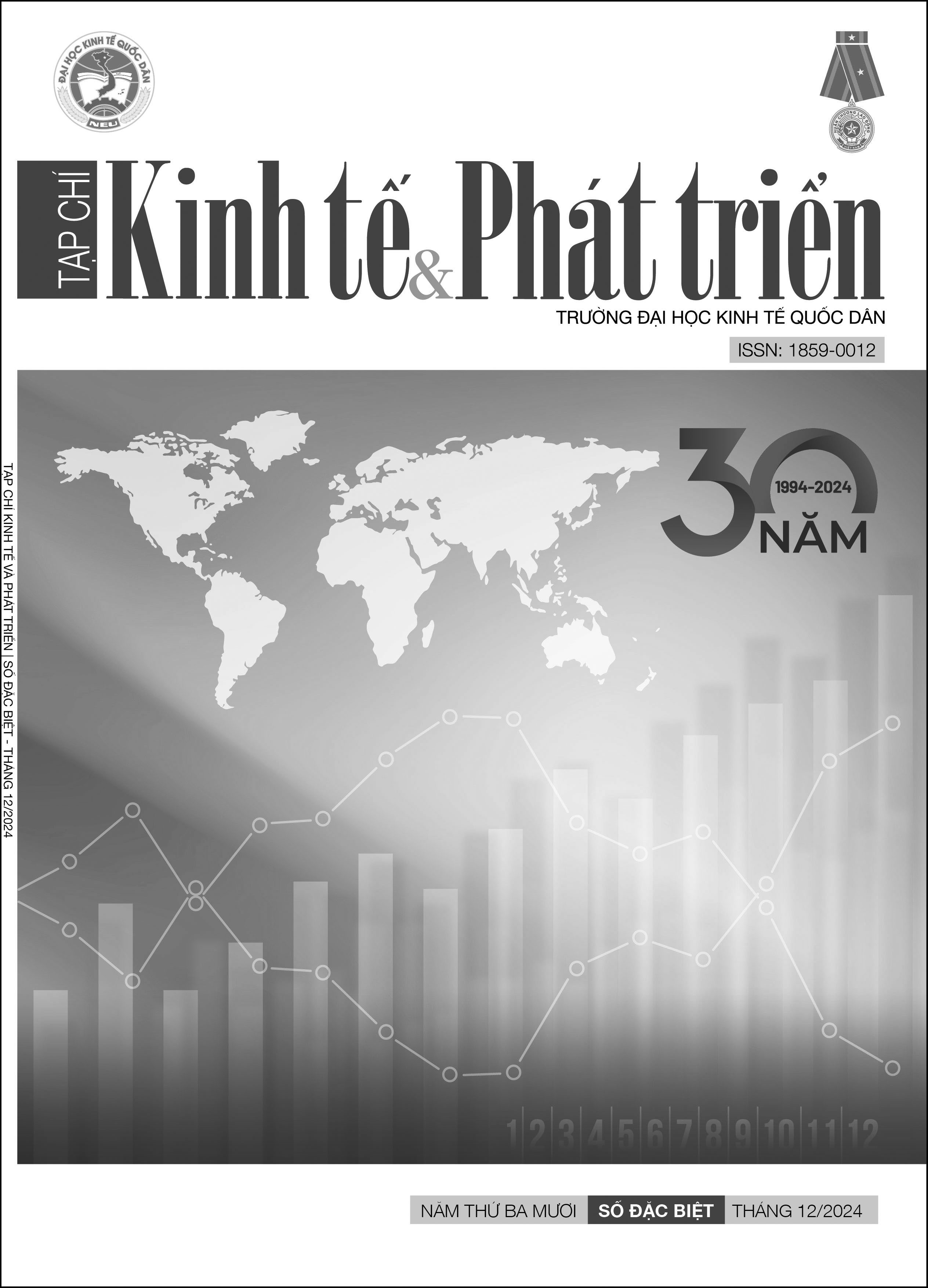Ứng dụng trí tuệ nhân tạo trong phát triển kinh tế xã hội
DOI:
https://doi.org/10.33301/JED.VI.2005Từ khóa:
Phát triển kinh tế, trí tuệ nhân tạo, Việt NamTóm tắt
Nghiên cứu này được thực hiện nhằm tìm hiểu về việc ứng dụng trí tuệ nhân tạo trong phát triển kinh tế xã hội. Phương pháp nghiên cứu tại bàn với các dữ liệu thứ cấp được thu thập từ nhiều nguồn bao gồm sách, tạp chí, báo, các bài viết trên internet. Kết quả cho thấy trí tuệ nhân tạo được ứng dụng phổ biến vào các lĩnh vực kinh tế xã hội và có tác động tích cực và đáng kể đến phát triển kinh tế xã hội. Cụ thể hơn, xu hướng công nghệ này là động lực mới cho tăng trưởng kinh tế. Dựa vào những phân tích, bài viết đề xuất một vài gợi ý về chính sách đối với Việt Nam trong việc quản lý sử dụng AI để thúc đẩy phát triển kinh tế xã hội.
Tài liệu tham khảo
Aghion, P., Jones, B. & Jones, C. (2017), ‘Artificial intelligence and economic growth’, Working Paper No. 23928, National Bureau of Economic Research. DOI: 10.3386/w23928.
Ali, O., Murray, P.A., Momin, M., Dwivedi, Y.K., & Malik, T. (2023), ‘The effects of artificial intelligence applications in educational settings: Challenges and strategies’, Technological Forecasting & Social Change, 198. DOI: https://doi.org/10.1016/j.techfore.2023.123076.
Araya, D. & King, M. (2022), ‘The Impact of Artificial Intelligence on Military Defence and Security’, CIGI Papers No. 263, The Centre for International Governance Innovation.
Gupta, R. & Katoch, H. (2023), ‘Role of Artificial Intelligence in Business Management’, International Journal for Multidimensional Research Perspectives, 1(3), 175-184.
Hatzius, J., Briggs, J., Kodnani, D. & Pierdomenico, G. (2023), ‘The potentially large effects of artificial intelligence on economic growth’, Working paper Economics Research, Goldman Sachs, 26 March 2023.
Hammond, K. (2015) Practical Artificial Intelligence for dummies, Narrative Science Edition, John Wiley and Sons, U.S.
Hanane, T. & Jiang, W. (2022), ‘The Impact of Artificial Intelligence on Sustainable Development in Electronic Markets’ Sustainability, 14, 3568. DOI: https://doi.org/ 10.3390/su14063568.
Maslej, N., Fattorini, L., Perrault, R., Parli, V., Reuel, A., Brynjolfsson, E., Etchemendy, J., Ligett, K., Lyons, T., Manyika, J., Niebles, J.C., Shoham, Y., Wald, R., & Clark, J. (2024), ‘The AI Index 2024 Annual Report,’ AI Index Steering Committee, Institute for Human-Centered AI, Stanford University, Stanford.
McCarthy, J. (1997), What is Artificial Intelligence?, last retrieved on Sep 5th 2024, from <http://www-formal.stanford.edu/jmc/whatisai/whatisai.html>.
Mohamed, A.T. (2024), ‘The impact of artificial intelligence on economic development’, Journal of Electronic Business & Digital Economics, 3(2), 142-55.
Mounir, E.K. & Ahmed, A.F. (2021), ‘Effects of Artificial Intelligence on Decision Making in Project Management’, American Journal of Industrial and Business Management, 11, 251-260.
Nuary, M.G., Judijanto, L., Nurliyah, E.S., Muriyanto, M., & El-Farra, S.A. (2022), ‘Impact of AI in Education and Social Development through Individual Empowerment’, Journal of Artificial Intelligence and Development, 1(2), 89-97.
Pallathadka, H., Ramirez-Asis, E.H., LoliPoma, T.P., Kaliyaperumal, K., Ventayen, R.J.M., & Naved, M. (2023), ‘Applications of artificial intelligence in business management, e-commerce and finance’, Material Today, 80(2023), 2610-2613. DOI: https://doi.org/10.1016/j.matpr.2023.03.123.
Philip, T. & Korinek, A. (2023), Economic Growth under Transformative AI, Working Paper 31815, National Bureau of Economic Research.
PwC (2017), Sizing the prize What’s the real value of AI for your business and how can you capitalise?’, last retrieved on Sep 5th 2024, from <https://www.pwc.com/gx/en/issues/analytics/assets/pwc-ai-analysis-sizing-the-prize-report.pdf>.
Rahmani, A.M., Rezazadeh, B., Haghparast, M., Chang, W.C., & Ting, S.G. (2023), ‘Applications of Artificial Intelligence in the Economy, Including Applications in Stock Trading, Market Analysis, and Risk Management’, IEEE Access, 11, 80769-80793. DOI: https://doi.org/10.1109/ACCESS.2023.3300036.
Rashid, A.B., Kausik, A.K., Sunny, A.A.H., & Bappy, M.H. (2023), ‘Artificial Intelligence in the Military: An Overview of the Capabilities, Applications, and Challenges’, International Journal of Intelligent Systems, 4, 1-31.
Sharma, G., Yadav, A., & Chopra, R. (2019), ‘Artificial intelligence and effective governance: A review, critique and research agenda’, Sustainable Futures, DOI: https://doi.org/10.1016/j.sftr.2019.100004.
Szabadföldi, I. (2021), ‘Artificial Intelligence in Military Application Opportunities and Challenges’, Land Forces Academy Review, 26(2), 157-165.
Thủ tướng Chính phủ (2021), Quyết định số 127/QĐ-TTg, Ban hành Chiến lược quốc gia về nghiên cứu, phát triển và ứng dụng Trí tuệ nhân tạo đến năm 2030, ban hành ngày 26/1/2021.
Trần Thị Vân Hoa (biên soạn, 2017), Cách mạng Công nghiệp 4.0: Vấn đề đặt ra cho phát triển kinh tế xã hội và hội nhập quốc tế của Việt Nam, Nhà xuất bản Chính trị Quốc gia Sự thật, Hà Nội.
Turing, A.M. (1950) ‘Computing machinery and intelligence’, Mind, LIX(236), 433-460.
Yang, C.H. (2022), ‘How artificial intelligence technology affects productivity and employment: Firm-level evidence from Taiwan’, Research Policy, 51(6). DOI: 10.1016/j.respol.2022.104536.
Yoganandham, G., & Elanchezhian, G. (2023), ‘Artificial intelligence (AI) and economic growth with reference to decision-making, social governance, accelerate Industry 4.0, and foster innovation- A theoretical assessment’, Science, Technology and Development, 12(8), 224-236.
Yoganandham, G., Mohammed Imran Khan E., & Elanchezhian, G. (2023), ‘Impact of Artificial Intelligence (Ai) on India's Economic Growth and Population - An Assessment’, International Journal of All Research Education and Scientific Methods, 11(9), 342-347.
Yong, Q., Zeshui, X., XinXin, W., & Marinko, S. (2023). ‘Artificial intelligence and economic development: An evolutionary investigation and systematic review’, Journal of the Knowledge Economy, 15, 1736-1770. DOI: 10.1007/s13132-023-01183-2.
Yugang, H.E. (2019), ‘The Effect of Artificial Intelligence on Economic Growth: Evidence from Cross-Province Panel Data’, Korean Journal of Artificial Intelligence, 7(2), 9-12.
Yuxin, F., Hongjun, C., & Jihui, S. (2022), ‘Impact of artificial intelligence on regional green development under China’s environmental decentralization system-based on spatial Durbin model and threshold effect’, International Journal of Environmental Research and Public Health, 19(22), 14776. DOI: 10.3390/ijerph192214776.
Zhao P., Gao Y., & Sun X.(2022), ‘How does artificial intelligence affect green economic growth?- Evidence from China’, Science of the Total Environment, 834, 155306. DOI: 10.1016/j.scitotenv.2022.155306.





